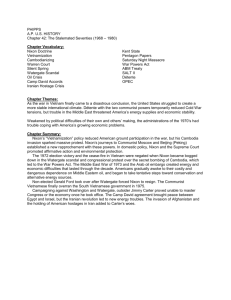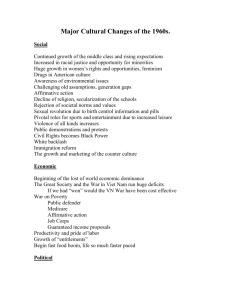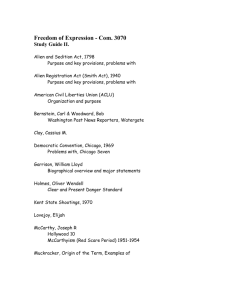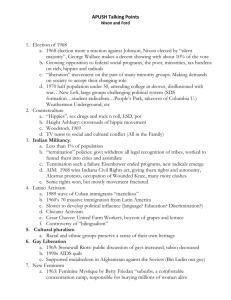Watergate – The Final Report -
advertisement
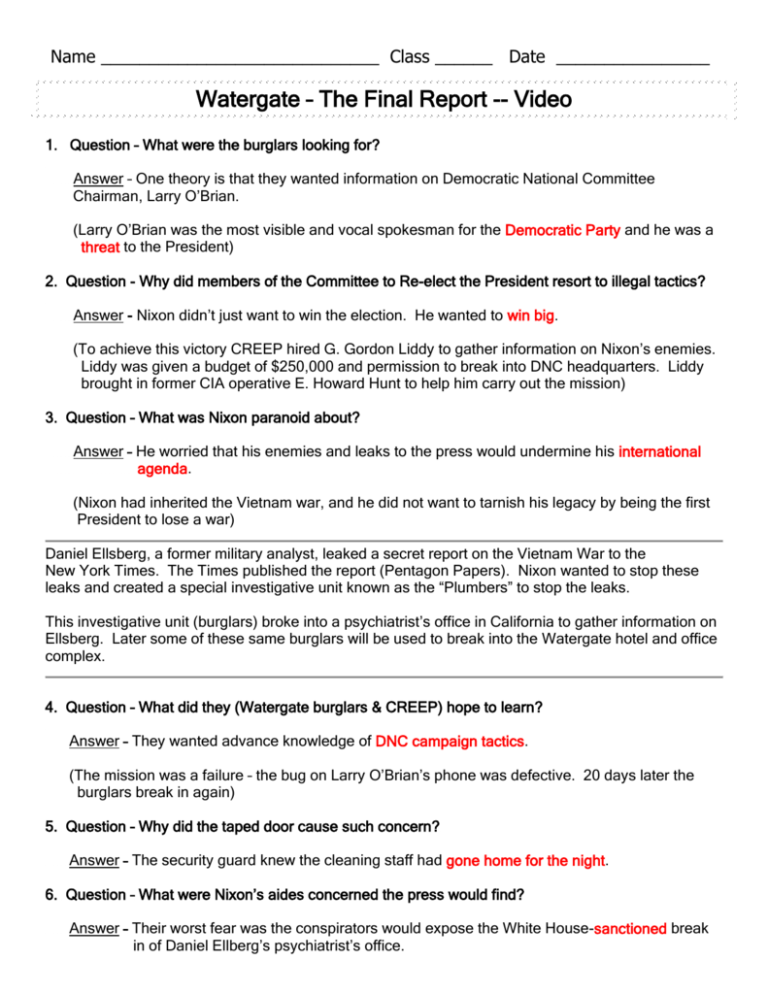
Name _____________________________ Class ______ Date ________________ Watergate – The Final Report -- Video 1. Question – What were the burglars looking for? Answer – One theory is that they wanted information on Democratic National Committee Chairman, Larry O’Brian. (Larry O’Brian was the most visible and vocal spokesman for the Democratic Party and he was a threat to the President) 2. Question - Why did members of the Committee to Re-elect the President resort to illegal tactics? Answer - Nixon didn’t just want to win the election. He wanted to win big. (To achieve this victory CREEP hired G. Gordon Liddy to gather information on Nixon’s enemies. Liddy was given a budget of $250,000 and permission to break into DNC headquarters. Liddy brought in former CIA operative E. Howard Hunt to help him carry out the mission) 3. Question – What was Nixon paranoid about? Answer – He worried that his enemies and leaks to the press would undermine his international agenda. (Nixon had inherited the Vietnam war, and he did not want to tarnish his legacy by being the first President to lose a war) Daniel Ellsberg, a former military analyst, leaked a secret report on the Vietnam War to the New York Times. The Times published the report (Pentagon Papers). Nixon wanted to stop these leaks and created a special investigative unit known as the “Plumbers” to stop the leaks. This investigative unit (burglars) broke into a psychiatrist’s office in California to gather information on Ellsberg. Later some of these same burglars will be used to break into the Watergate hotel and office complex. 4. Question – What did they (Watergate burglars & CREEP) hope to learn? Answer – They wanted advance knowledge of DNC campaign tactics. (The mission was a failure – the bug on Larry O’Brian’s phone was defective. 20 days later the burglars break in again) 5. Question – Why did the taped door cause such concern? Answer – The security guard knew the cleaning staff had gone home for the night. 6. Question – What were Nixon’s aides concerned the press would find? Answer – Their worst fear was the conspirators would expose the White House-sanctioned break in of Daniel Ellberg’s psychiatrist’s office. (Just three days after the Watergate break in Nixon met with his chief of staff H.R. Haldeman. 18½ minutes of that conversation are missing from the White House tape) 7. Question – Was the tape deliberately erased? Answer – Yes, it seems likely because it was erased as many as nine different times. (Washington Post Reporter, Bob Woodward dug deeper into the story and met with a confidential source known only as “Deep Throat”) 8. Question – How important was Deep Throat to the Watergate story? Answer – The mystery surrounding his identity exaggerated his significance, but his role was critical. (Woodward protected Deep Throat’s identity for more than 30 years. Eventually it was revealed that Deep Throat was Mark Felt, associate director of the FBI) 9. Question – Did the White House know who was leaking information to the Washington Post? Answer – The White House suspected it was Mark Felt. Mark Felt was not promoted to FBI director after J. Edgar Hoover died. Haldeman told Nixon it was Felt who was leaking information Judge John Sirica asked the Watergate burglars if the White House was involved. They told Sirica no, but then Judge Sirica wanted to know: 10. Question – Who was paying the burglar’s legal bills? Answer – The Committee to Re-elect the President paid the burglars directly out of Nixon’s campaign funds. John Dean told Nixon that the burglars were being paid money to keep quiet and that this cycle of “hush money” would never end. Nixon then dismissed Haldeman, Ehrlichman, and Dean. 11. Question – Why did Nixon decide to dismiss his closest aides? Answer – He hoped to salvage his presidency by cutting all ties to anyone linked to Watergate. (The dismissals backfire and only make Nixon more vulnerable – he now faced the scandal alone. Then former presidential aide, Alexander Butterfield told the Senate investigating committee that Nixon had a hidden taping system) 12. Question – What prompted the Committee to ask about listening devices in the Oval Office? Answer – A Senate Committee staffer stumbled upon the information. 13. Question – Why was Nixon taping his conversations? Answer – The taping system was for his memoirs. (Since the presidency of FDR presidents had secretly recorded conversations in the Oval Office. Nixon had installed the most extensive system of microphones and wiretaps to date. Nixon, at first could have destroyed the tapes – because they belonged to him). 14. Question – Why didn’t Nixon destroy the tapes? Answer – He intended to erase the most sensitive recordings, but never did It now appeared that the House of Representatives would vote for impeachment which would lead to a trial in the Senate. However, two-thirds of the Senate would have to vote against Nixon in order to remove him from office. 15. Question – Would the Senate have removed Nixon from office? Answer – Yes, even members of his own party were poised to remove him. (Barry Goldwater and other top Republicans told Nixon he did not have the votes to avoid conviction) 16. Question – What was the President’s state of mind? Answer – He was moody, unstable, and at times appeared suicidal. Nixon asked his new Chief of Staff, Alexander Haig, if he had a pistol. Haig told him no. Nixon then resigned. Two years after the resignation the public still had questions. 17. Question – Did President Nixon play any role in the Watergate break-in? Answer – There is no clear evidence linking him to the planning or execution of the actual burglary. However, Nixon did create the Plumbers and had continually asked for information on his enemies. 18. Question – What did the President know and when did he know it? Answer – Nixon’s crime was the Watergate cover-up, which he orchestrated. As a result of Watergate Congress took the following actions: 1) Cut the Post War funding of the South Vietnamese – leading to the fall of Saigon 2) Passed the War Powers Act (over Nixon’s veto)– which limited the President’s ability to use the military without approval from Congress. (President could not deploy troops for more than 90 days without Congressional approval. 3) Required disclosure of campaign funds for candidates.




